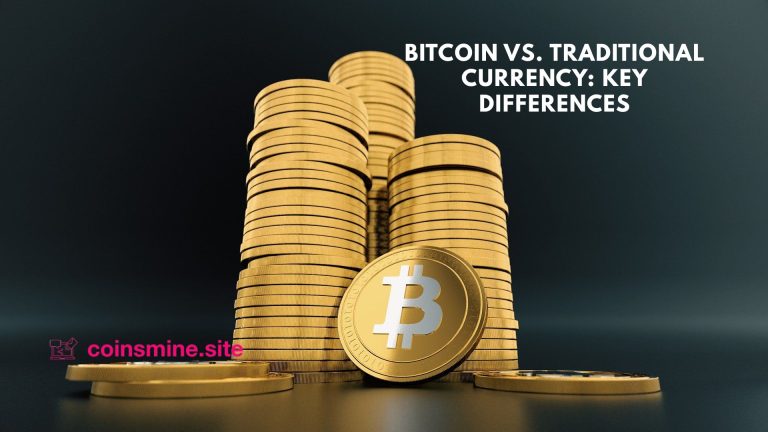Bitcoin vs. Traditional Currency: Key Differences: The world is talking about the future of money because of Bitcoin, the first cryptocurrency. Bitcoin functions on a decentralized digital network free from centralized authority, in contrast to conventional currencies like the US dollar or euro, which are issued and governed by governments.
Although they are both repositories of value and means of exchange, they differ fundamentally in terms of supply, control, transaction processes, and legal standing. To understand how Bitcoin challenges the established financial system and what part it might play in the developing field of digital finance, it is imperative to comprehend these important differences.
Bitcoin vs. Traditional Currency: Key Differences
Bitcoin has become a ground-breaking digital currency in recent years, upending our preconceived notions about conventional government-issued money. Although the underlying purpose of both Bitcoin and conventional currencies is to facilitate transactions and operate as a store of value, their structure, control, and usage are very different. To help you comprehend their special qualities and consequences for the future of finance, this essay examines the main distinctions between Bitcoin and conventional cash.
(1) Nature and Form.
Government-issued legal tender is known as traditional currency, or fiat money. The US dollar, euro, Japanese yen, and others are a few examples. These currencies are available both digitally in bank accounts and physically as coins and banknotes. The supply of these currencies is governed and controlled by governments and central banks.
Bitcoin, in contrast, exists solely as a digital asset without any physical representation. It functions on a decentralized system known as blockchain, which publicly logs every transaction.
(2) Control and Supply.
One of the key distinctions is authority. Conventional currencies are regulated by central banks and governmental institutions. Central banks can affect the money supply by creating additional currency or applying monetary policies such as changing interest rates. This authority enables governments to control inflation, stabilize economies, and react to financial emergencies.
This fixed quantity is embedded within its protocol and cannot be altered without the agreement of the network participants, which is improbable. Bitcoin is created via a method known as mining, in which specialized machines solve intricate mathematical equations to confirm transactions and introduce new coins into circulation. This decentralized and algorithm-based method eliminates the threat of inflation that can occur due to excessive money printing, earning Bitcoin the nickname “digital gold.”
(3) Transaction Process.
Conventional currency transfers usually require intermediaries like banks, payment processors, and clearinghouses. When you send money, these intermediaries confirm and manage the transaction process, which can take anywhere from a few seconds to several days, particularly for international transfers. Furthermore, these intermediaries frequently impose fees for their services.
Bitcoin transactions happen directly between individuals (peer-to-peer) without requiring middlemen. A decentralized group of miners validates these transactions, which are then recorded on the blockchain, a public ledger.
(4) Privacy and Transparency.
Conventional currency transactions conducted via banks generally remain confidential between the concerned parties but are subject to scrutiny by governmental bodies and financial organizations. These organizations can track, freeze, or reverse transactions when necessary. Although this system provides safeguards against fraud and money laundering, it also raises issues regarding privacy.
Bitcoin transactions have a degree of pseudonymity. Although every transaction can be seen on the public blockchain, the identities associated with wallet addresses are not automatically connected to personal information. This openness provides a lasting and immutable record of transactions but necessitates extra tools to connect addresses to real-world identities. Some individuals appreciate this balance of privacy and transparency, while others express concern that it might enable illegal activities.
(5) Value Stability.
Fiat currencies are intended to remain fairly stable to uphold purchasing power and confidence in the economy. Central banks strive to maintain inflation rates that are both moderate and foreseeable. Nonetheless, currencies can decrease in value as a result of hyperinflation, political turmoil, or poor economic governance.
In contrast, Bitcoin is recognized for its fluctuating prices. Its valuation is primarily influenced by market demand, speculation, and trends in adoption, rather than by fundamental economic indicators. Although this volatility has resulted in significant price surges, it
(6) Legal Status and Acceptance.
Conventional currencies are recognized as legal tender within their nations, which means they must be accepted for settling payments and obligations. Their broad acceptance is ensured by legislation, bolstered by governmental systems.
The legal standing of Bitcoin differs from one country to another. Several nations have welcomed it as a valid form of payment. Conversely, some have enacted limitations or outright prohibitions.
(7) Accessibility and Inclusion.
Conventional banking systems necessitate that individuals possess bank accounts, identification, and access to financial institutions. This situation leaves billions of people globally without banking services or inadequately served due to their location, financial standing, or absence of necessary documentation.
Bitcoin presents an option that merely needs internet connectivity and a digital wallet. This ability to foster financial inclusion is among Bitcoin’s most compelling attractions.
Conclusion.
Bitcoin and traditional currencies have unique advantages and disadvantages.. Conventional currencies enjoy governmental support, stability, and widespread acceptance, but they may experience inflation and centralized oversight. Bitcoin provides decentralization, a capped supply, and greater privacy, although it faces challenges with price fluctuations and regulatory ambiguity.



